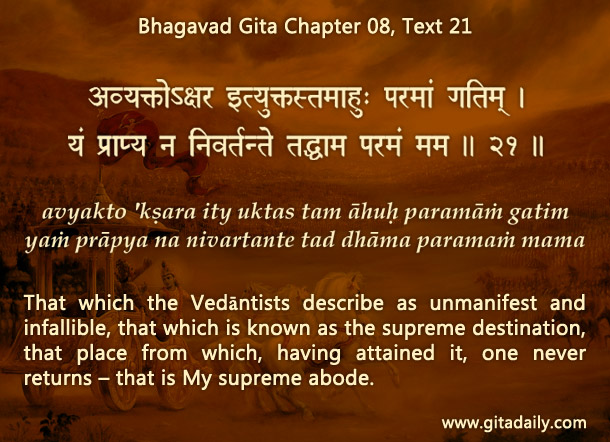In the philosophy of language, a basic principle is that the meanings of words are determined not just by the words themselves but also by their context. This principle is illustrated in the Bhagavad-gita’s use of the word ‘avyakta’ in two successive verses: 08.20 and 08.21. Literally, the word means ‘unmanifest’ and refers to things not perceivable to the senses.
The first verse (08.20) states that beyond this manifest and unmanifest existence, there is another existence that is never destroyed. And the next verse (08.21) describes that existence: It is the supreme destination, is Krishna’s abode, and is called infallible and unmanifest. The two verses read in sequence say: the world beyond the unmanifest (08.20) is known as unmanifest (08.21).
To understand what this means, we need to look at the context, both textual and conceptual. The textual context is that these verses appear in a Gita section (08.15-22) that compares the ephemerality of the material world with the eternality of the spiritual world. Gita (08.20) is a transitional verse that contrasts the material world discussed earlier (08.15-19) with the spiritual world discussed next (08.20-22)
The conceptual context of these verses is a theistic presentation of sankhya philosophy. This school of philosophy posits that the manifest realm is made of gross matter, and the unmanifest realm is made of two substances: subtle matter and spirit. Sankhya cosmogenesis posits that gross matter emerges from subtle matter during cosmic creation and returns to a subtle state during cosmic destruction. Further, though the subtle material realm and the spiritual realm are both unmanifest, the spiritual realm is categorically different.
Seen in this context, the point of these two verses is: Beyond the manifest material existence and the unmanifest material existence is the unmanifest spiritual existence – that is Krishna’s abode and life’s supreme destination.
To know more about this verse, please click on the image
Explanation of article:
Podcast:


Leave A Comment